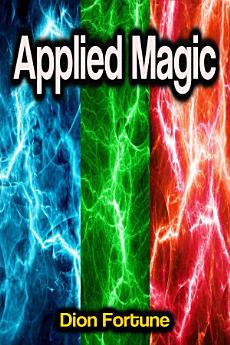Applied Magic
ធ្នូ 2021 · Phoemixx Classics Ebooks
សៀវភៅអេឡិចត្រូនិច
177
ទំព័រ
family_home
មានសិទ្ធិ
info
reportការវាយតម្លៃ និងមតិវាយតម្លៃមិនត្រូវបានផ្ទៀងផ្ទាត់ទេ ស្វែងយល់បន្ថែម
អំពីសៀវភៅអេឡិចត្រូនិកនេះ
Applied Magic Dion Fortune - Applied Magic is a selection of Dion Fortune's writings on the practical applications of magical and esoteric techniques. Everyone has the ability to access the invisible planes of existence- a whole kingdom of mind and spirit- which cannot be perceived with the physical senses. Fortune provides invaluable guidance to anyone intent on increasing their inner awareness. She declares, "Esoteric tradition admits of no exclusiveness; it is the very essence of its spirit that it blasphemes no God that has been hallowed by our devotion. It sees all religions as the expressions of our spirit rather than the personal revelation of a jealous God to His chosen people. It suffers from neither superstitious awe nor bigoted fear."Contents1. The Occult Way2. Some Practical Applications of Occultism3. The Group Mind4. The Psychology of Ritual5. The Circuit of Force6. The Three Kinds of Reality7. Non-humans8. Black Magic9. A Magical Body10. The Occult Field Today11. Esoteric Glossary
អំពីអ្នកនិពន្ធ
Violet Mary Firth Evans (better known as Dion Fortune), was a British occultist and author. Her pseudonym was inspired by her family motto "Deo, non fortuna" (Latin for "by God, not fate").From 1919 she began writing a number of novels and short stories that explored various aspects of magic and mysticism, including The Demon Lover, The Winged Bull, The Goat-Foot God, and The Secrets of Dr. Taverner. This latter is a collection of short stories based on her experiences with Theodore Moriarty. Two of her novels, The Sea Priestess and Moon Magic, became influential within the religion of Wicca, especially upon Doreen Valiente.Of her non-fiction works on magical subjects, the best remembered of her books are; The Cosmic Doctrine, meant to be a summation of her basic teachings on mysticism; The Mystical Qabalah, an introduction to Hermetic Qabalah; and Psychic Self Defence, a manual on how to protect oneself from psychic attacks. Though some of her writings may seem dated to contemporary readers, they have the virtue of lucidity and avoid the deliberate obscurity that characterised many of her forerunners and contemporaries.
វាយតម្លៃសៀវភៅអេឡិចត្រូនិកនេះ
ប្រាប់យើងអំពីការយល់ឃើញរបស់អ្នក។
អានព័ត៌មាន
ទូរសព្ទឆ្លាតវៃ និងថេប្លេត
ដំឡើងកម្មវិធី Google Play Books សម្រាប់ Android និង iPad/iPhone ។ វាធ្វើសមកាលកម្មដោយស្វ័យប្រវត្តិជាមួយគណនីរបស់អ្នក និងអនុញ្ញាតឱ្យអ្នកអានពេលមានអ៊ីនធឺណិត ឬគ្មានអ៊ីនធឺណិតនៅគ្រប់ទីកន្លែង។
កុំព្យូទ័រយួរដៃ និងកុំព្យូទ័រ
អ្នកអាចស្ដាប់សៀវភៅជាសំឡេងដែលបានទិញនៅក្នុង Google Play ដោយប្រើកម្មវិធីរុករកតាមអ៊ីនធឺណិតក្នុងកុំព្យូទ័ររបស់អ្នក។
eReaders និងឧបករណ៍ផ្សេងទៀត
ដើម្បីអាននៅលើឧបករណ៍ e-ink ដូចជាឧបករណ៍អានសៀវភៅអេឡិចត្រូនិក Kobo អ្នកនឹងត្រូវទាញយកឯកសារ ហើយផ្ទេរវាទៅឧបករណ៍របស់អ្នក។ សូមអនុវត្តតាមការណែនាំលម្អិតរបស់មជ្ឈមណ្ឌលជំនួយ ដើម្បីផ្ទេរឯកសារទៅឧបករណ៍អានសៀវភៅអេឡិចត្រូនិកដែលស្គាល់។








